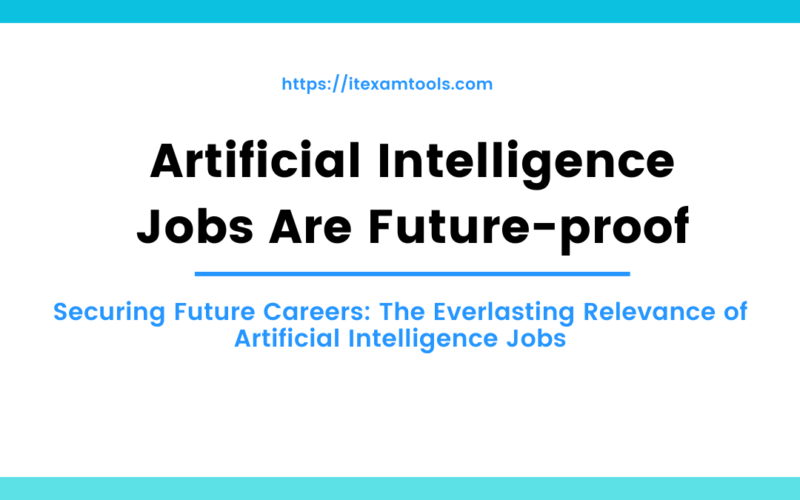Cisco OSPF Basic Configuration In this Cisco CCNA tutorial, you’ll learn how to do a basic configuration of OSPF on our Cisco routers. Scroll down for the video and also text…
Artificial Intelligence Jobs Are Future-proof

Securing Future Careers: The Everlasting Relevance of Artificial Intelligence Jobs
COVID-19 has radically changed our lives. Its impacts can be felt across workplaces, particularly where it has forced industries to reduce their activities including leisure, restaurants, oil and gas, and airlines. Artificial Intelligence Jobs.
Yet throughout COVID-19, the technology industry remains strong. The pandemic has spurred technological innovation. Technology enables work to continue despite lockdowns and other pandemic mitigation measures. Analysts project the tech industry will be worth $5 trillion in 2021, with a growth rate comparable to what it was prior to the pandemic (4 to 5%).
Artificial intelligence has a strong foothold in the tech industry and has gained influence during COVID-19. Artificial intelligence and its jobs are future-proof — unlikely to become obsolete.

Artificial Intelligence and Future Job Prospects
Artificial intelligence describes computing to mimic human behaviors and complete human tasks. AI technologies are progressive; they aim to improve people’s lives. Examples include surgical robots, wildfire-monitoring drones, and naturally speaking artificial personal assistants.
Experts predict the global AI software market will be worth $126 billion by 2025. A 2019 Gartner survey indicates 37% of business enterprises already implement AI in their workplaces.
Industries that benefit from AI now and will benefit from AI in the future include:
- Cybersecurity — AI technologies can improve threat detections, mitigate and prevent cybercrimes.
- Healthcare — Healthcare practitioners use AI to detect and diagnose diseases (e.g. cancers, respiratory diseases) and perform surgeries (with robotic arms).
- Business Intelligence — Businesses employ AI and big data to extract meaningful insights about their performance metrics.
- Information Technology (IT) and Cloud Computing — Cloud computing enables specialists like data scientists and AI-product developers to run demanding AI learning models (e.g. deep neural networks for humanized robots).
- Transportation — Self-driving cars use AI technologies like computer vision to “see” and safely navigate their surroundings.
- Manufacturing — Businesses use AI to assemble factory equipment.
Jobs in AI have great salary potential. People working in areas relevant to AI — like software development and data science — can expect to see increases in the jobs available during this decade.
The World Economic Forum estimates that 97 million new jobs may arise by 2025. Analysts forecast these jobs will be better adapted to a future with different divisions of labor between humans and machines than you are used to now — a future more mechanized and automated with AI technologies.

Which Skills Do You Use in AI Jobs?
The skills you need to work in AI are diverse and interesting. They include:
- Algorithms and Data Structures. Artificial intelligence specialists create and use algorithms and data structures to enable AI technologies to function.
- Computers. A solid understanding of computers enables you to design artificially intelligent driving drones or autonomous vehicles. AI-relevant computer skills include software development, computer programming, computer design, and information processing.
Computer programming languages include: - Machine Learning: Machine learning is a focal area of AI in which computer algorithms improve on their own through experience. Self-driving cars, surgical robots, and game-playing computers use machine learning to develop their skills.
Machine learning frameworks include: - Robotics. Roboticists design machines like planetary rovers that explore Mars or Jupiter, flying drones that survey landscapes, or humanoid robots who socialize and help with everyday tasks.
- Data Science. Data scientists analyze and prepare massive amounts of data for processing by AI technologies and enable AI to function.
Data science engines and frameworks include:
Learn more about industry-relevant AI job skills.
Employers foresee job skills like critical thinking, active learning, problem solving, and analysis rising in importance as we head toward 2025. You can keep your skill set relevant to AI and future-proof jobs through reskilling (acquiring new skills) and upskilling (improving existing skills)

What Types of Jobs Can You Get in AI?
In-demand occupations connected to artificial intelligence include:
- Data scientist
- Machine learning engineer
- Software engineer
- Robotics engineer
- Self-driving car engineer
But the list doesn’t stop here. AI influences employees across industries like biologists, professional gamers, content developers, designers, astronomers, physicists, and business analysts.
Top companies with AI jobs include Amazon, Alphabet, Microsoft, Netflix, and Apple. Many companies even provide employees with enterprise training programs to ensure their talent has the latest AI skills.
Read more about what data scientists and machine learning engineers do.
Train for AI Jobs of the Future With Udacity
You can prepare for the increasing influence of AI in the workplace by adapting your skill set. Maybe you want to learn about computer vision, how drones work, or how to use machine learning frameworks and libraries like PyTorch or TensorFlow. There are many options available to you.
The Udacity team is passionate about AI and equips you with in-demand skills in technology and business. Udacity currently offers 15 courses in its School of Artificial Intelligence with AI Nanodegree programs for learners across skill levels like:
Check out the course catalog and consider registering for one of Udacity’s many interesting Nanodegree programs in artificial intelligence today!








